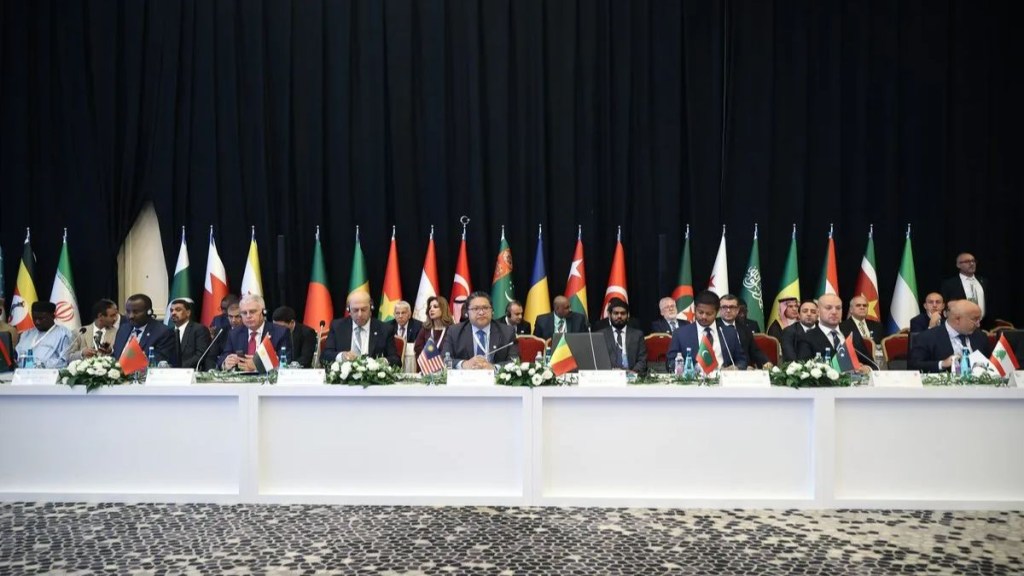The recent Israeli military aggression against the Palestinian people has sparked international outrage and calls for immediate action. The Organisation of Islamic Cooperation (OIC) convened an emergency meeting in Jeddah to address the escalating crisis, which has seen an alarming loss of life and the destruction of vital infrastructure.
Iranian Foreign Minister Hossein Amirabdollahian proposed a comprehensive oil embargo and other sanctions on Israel, urging OIC members to expel all Israeli ambassadors.
The OIC’s Standpoint
During the extraordinary open-ended meeting in Jeddah, the OIC Executive Committee, representing 57 member states, issued a final communiqué that underscored several key points. First and foremost, it called for an immediate cessation of the Israeli military aggression against the Palestinian people. The OIC also emphasized the need to lift the siege imposed on the Gaza Strip, condemning the brutal attacks on civilians, including the bombing of infrastructure and threats of atrocities. The Committee highlighted the urgent necessity of providing humanitarian, medical, and relief aid to the Gaza Strip, advocating for the opening of humanitarian corridors.
Al-Ahli Arab Hospital Tragedy
The OIC Executive Committee categorically condemned the targeting of Al-Ahli Arab Hospital in Gaza by Israel’s occupation forces. This act resulted in the loss of hundreds of innocent lives, making it a flagrant violation of international humanitarian law. The OIC stressed the importance of the international community’s swift action and accountability for these war crimes against humanity. While Israel claims it was targeting terrorists, the loss of innocent lives is undeniable, and the world is watching closely.
Responsibility and Humanitarian Crisis
Israel, as the occupying power, bears full responsibility for the fate of civilians in Gaza. The blockade, the bombardment, and the lack of basic necessities such as electricity, food, and clean water have created a dire humanitarian crisis. The OIC firmly stated that Israel’s actions amount to a violation of international law and international humanitarian law. The collective punishment inflicted upon the people of Gaza is a breach of the Geneva Conventions and divine laws.
Protection of Civilians
The OIC reiterated its stance on the importance of protecting civilian lives. No action should target civilians, which is inconsistent with international law, international humanitarian law, and divine principles. The Committee expressed its firm rejection of any calls to displace the population of the Gaza Strip and voiced its unwavering support for the Palestinian people’s right to remain on their land.
UN Security Council’s Role
The OIC expressed deep regret and condemnation of the United Nations Security Council’s failure to take decisive action to halt the Israeli occupying forces’ war crimes against the Palestinian people in Gaza and the occupied Palestinian territory. This inaction undermines the Security Council’s role in maintaining international peace and security and protecting unarmed civilians.
Concerns in Al-Quds and the West Bank
The OIC also voiced concerns over the escalation of attacks by the Israeli occupation army and settler terrorism in Al-Quds Al-Sharif and the West Bank. The ongoing aggression against the civilian population and their properties, including the building and expansion of settlements, threatens the sanctity of holy sites and Al-Aqsa Mosque. The OIC called for the full protection of these sacred places in Al-Quds and the prevention of any violations.
International Positions and Double Standards
The OIC deplored international positions that support the brutal aggression against the Palestinian people and grant Israel impunity. The Committee criticized the use of double standards that cover for the occupying power, which only serves to fuel the conflict and further punish the Palestinian people, including by cutting off humanitarian aid.
The Path to Peace
The OIC firmly asserted that peace, security, and stability in the region cannot be achieved without ending the Israeli colonial occupation and its oppressive practices against the Palestinian people. The organization emphasized the importance of recognizing the Palestinian people’s inalienable rights, including their right to self-determination, independence, and return, in line with international law and United Nations resolutions.
The OIC’s call for an oil embargo and other sanctions on Israel, along with the expulsion of Israeli ambassadors, reflects the organization’s deep concern over the ongoing Israeli-Palestinian conflict. While the situation is complex and marked by differing narratives, the humanitarian crisis in Gaza is undeniable, and the loss of innocent lives is a global concern. The OIC’s stance sends a strong message to the international community, urging action and accountability to address the current crisis and work towards a lasting solution for peace in the region.
